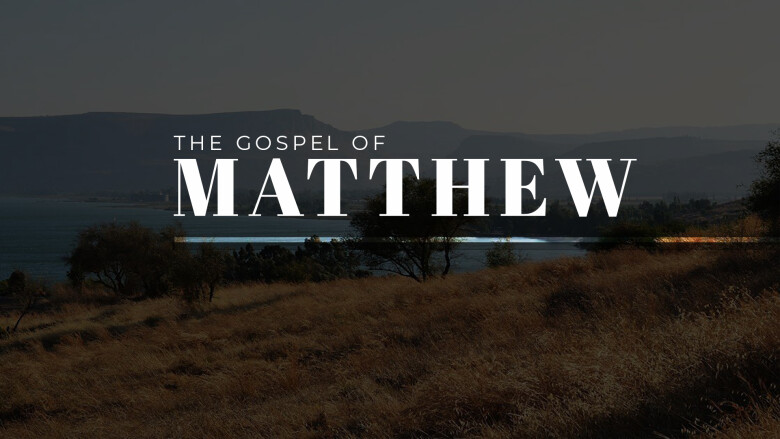Matthew
Apr 06, 2025 | Greg Johnson
Conflict Resolution
In this week of our Matthew sermon series, Greg delves into the practical teachings of Jesus on conflict resolution and reconciliation, as found in Matthew 18. He emphasizes the importance of resolving horizontal relationships among believers, highlighting that reconciliation is a crucial aspect of living out the Christian faith.
Key Points:
-
The Importance of Reconciliation:
- Greg begins by referencing Matthew 5:23-24, where Jesus teaches that reconciliation with others is more important than offering gifts at the altar. This underscores the priority Jesus places on mending broken relationships.
- Unforgiveness is not an option for followers of Jesus, as highlighted in Matthew 6:14-15. Forgiving others is essential for receiving forgiveness from God.
-
Self-Examination Before Confrontation:
- Before addressing someone else's sin, believers must first examine their own lives, as taught in Matthew 7:3-5. This involves removing the "plank" from one's own eye before addressing the "speck" in another's.
-
Biblical Peacemaking:
- The sermon outlines the steps for biblical conflict resolution from Matthew 18:15-20. The process involves going directly to the person in sin, bringing one or two others if necessary, and eventually involving the church if reconciliation is not achieved.
- The goal of confrontation is always restoration and reconciliation, not judgment or condemnation.
-
Active Peacemaking:
- Peacemaking is active, not passive. It requires believers to engage in difficult conversations with love and humility, rather than avoiding conflict or gossiping about others.
-
The Role of Community:
- Community is vital for accountability and support. Believers are encouraged to have relationships where they can speak the truth in love and receive correction with grace.
-
The Power of Prayer and Compassion:
- Prayer is essential before engaging in conflict resolution. Believers should seek God's guidance and approach others with compassion, mirroring the sacrificial love of Jesus.
Small Group Discussion Questions:
-
Reflect on Reconciliation:
- How does Jesus' teaching in Matthew 5:23-24 challenge your current approach to unresolved conflicts in your life?
- Why do you think Jesus places such a high priority on reconciliation among believers?
-
Self-Examination:
- What steps can you take to ensure you are examining your own life before addressing someone else's sin?
- How can you cultivate a habit of self-reflection and repentance in your daily walk with Christ?
-
Biblical Peacemaking:
- Have you ever had to confront someone about a sin? How did you approach it, and what was the outcome?
- What are some practical ways you can ensure your motive for confrontation is love and restoration?
-
Active vs. Passive Peacemaking:
- In what ways do you tend to avoid conflict, and how can you become more proactive in addressing issues?
- How can you differentiate between peacemaking and peacekeeping in your relationships?
-
Community and Accountability:
- Do you have relationships where you feel comfortable receiving and giving correction? How can you build such relationships?
- How does being part of a community help you stay accountable in your walk with Christ?
-
Prayer and Compassion:
- How can prayer prepare your heart for difficult conversations?
- In what ways can you show compassion to someone who is resistant to reconciliation?
-
Reflect on Jesus' Example:
- How does Jesus' sacrificial love on the cross inspire you to approach conflict and reconciliation differently?
- What steps can you take to embody the way of Jesus in your relationships, especially when dealing with conflict?
This sermon challenges believers to actively pursue reconciliation, grounded in love and humility, reflecting the heart of Jesus in all interactions.
Series Information

Join us as we embark on a transformative journey through the Gospel of Matthew, exploring the profound teachings and events that define this pivotal book of the New Testament. This series will delve into the core messages of Jesus, from the Sermon on the Mount to His parables, miracles, and the ultimate sacrifice of His life.
Throughout this series, we will uncover themes of faith, righteousness, humility, and divine authority, as well as the cost of discipleship and the call to immediate and wholehearted commitment. Each week, we will explore different aspects of Jesus' ministry, including healing, prayer, true righteousness, and the challenges of living out His teachings.
We will examine the principles Jesus laid out for living a life aligned with God's will, from understanding true blessedness and the nature of God's kingdom to embracing radical love, mercy, and the immediate call to follow Him. This series aims to deepen our faith and challenge us to live out the values of Jesus' teachings in our daily lives.
Join us for the "Matthew" series and discover how the teachings and life of Jesus can transform your heart and mind, guiding you to a more meaningful and fulfilling walk with Christ.
